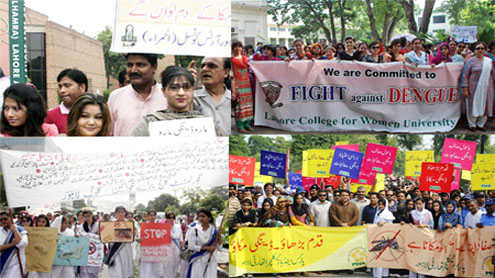 ISLAMABAD: The government is examining two kinds of tax on assets like Gross Asset Tax (GAT) or a Minimum Alternate Tax (MAT), but nothing has been finalised in this regard. Both the proposals are being analysed for introducing some kind of tax on assets to give a clear message to the general public that the government is determined to impose taxes on wealthy people.Federal Board of Revenue’s (FBR) Inland Revenue Member Khawar Khurshid Butt informed reporters on Thursday on the conclusion of the pre-budget seminar organised by the Association of Chartered Certified Accountants (ACCA). The tax target projection of Rs 1952 billion for next fiscal year 2011-2012 was done on the basis of calculations that the FBR would be able to collect Rs 1588 billion by the end of June 2011. Other factors taken into account included 15 percent inflation, growth of 3.0 percent and budgetary and enforcement measures to be taken in next fiscal, he added.
ISLAMABAD: The government is examining two kinds of tax on assets like Gross Asset Tax (GAT) or a Minimum Alternate Tax (MAT), but nothing has been finalised in this regard. Both the proposals are being analysed for introducing some kind of tax on assets to give a clear message to the general public that the government is determined to impose taxes on wealthy people.Federal Board of Revenue’s (FBR) Inland Revenue Member Khawar Khurshid Butt informed reporters on Thursday on the conclusion of the pre-budget seminar organised by the Association of Chartered Certified Accountants (ACCA). The tax target projection of Rs 1952 billion for next fiscal year 2011-2012 was done on the basis of calculations that the FBR would be able to collect Rs 1588 billion by the end of June 2011. Other factors taken into account included 15 percent inflation, growth of 3.0 percent and budgetary and enforcement measures to be taken in next fiscal, he added.
FBR IR member said that the FBR has dropped the budget proposal to introduce a major change in the Universal Self Assessment Scheme (USAS) of the Income Tax Ordinance 2001 by restricting the USAS to only regular filers of income tax returns and statements and non-filers should be excluded from the self-assessment scheme.The government does not want to impose any kind of heavy taxation on the general public keeping view of inflation and problems of masses in the current economic situation in the country.The FBR member admitted that there is a general perception among the masses that the government has not imposed heavy taxes on the elite class of the society. The government is exploring different avenues to take steps for taxation of assets on wealthy class. However, it is yet to be determined that what kind of taxation measures would be taken by the government on the wealthy class of the society. During the budget preparation exercise, the FBR is seriously thinking on the lines to impose some kind of tax on assets of wealthy persons to satisfy the general public, who is already burdened with indirect taxes.
Responding to a query, he said that the FBR will be able to reach Rs 130 billion for the month of April 2011 after compilation of final figures. Referring to the conference chief commissioner, Butt said that the FBR chairman has directed the chief commissioners to submit a work plan within one-two days about the current demands created and recovered. The chief commissioners would also submit the numbers about the exact income tax demands to be recovered in the remaining months of current fiscal year. The chief commissioner conference also discussed the issue of cleansing of NTN Master Index. Out of 3.1 million NTN holders, the actual return filers are less and the committee on the cleansing of NTN Master Index would also determine the actual dormant companies and inactive units, which have closed down their businesses. The committee headed by Chief Commissioner Inland Revenue (IR) Large Taxpayer Unit (LTU), Lahore Khalid Aziz Banth has drafted a standing operating procedure (SOP), which has been distributed among the chief commissioners. The FBR IR member was happy to share that over 60 percent of the Regional Tax Offices (RTOs) have achieved the sales tax and federal excise duty targets and some RTOs have even surpassed the targets.
When asked about seizure of bank accounts of different companies, he said that the bank accounts of Pakistan Telecommunication Company Limited (PTLC) were seized for recovery of sales tax arrears. The FBR has recovered Rs 4 billion from the PSO and another Rs 4-5 billion would also be deposited by the unit. He said that the LTU, Islamabad has approached the Ministry of Petroleum and Natural Resources to pursue recovery of income tax demands raised against the oil and gas exploration companies. In this regard, the chief commissioner has contacted the petroleum secretary to ensure recovery of the income tax demands against the oil and gas exploration and production companies. – Dailytimes












